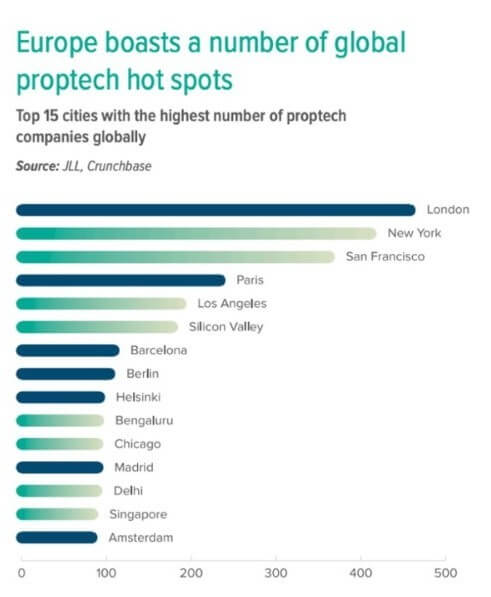With the advancement of technology in many sectors resulting in growth, from FinTech to GreenTech, it’s only natural that PropTech has followed suit. The sector has transformed within the past few years, with funding increasing almost 5 fold. London is still the leading city for PropTech companies globally.

One of the biggest assets of PropTech that has been harnessed by companies is the management of data. Despite technological advancements in recent years, data is still woefully mismanaged. PropTech software solutions encompass everything from seamless CRM systems, wayfinding, advanced security solutions, environmental sensor technology, access control, automated building management systems, and data-led facilities management solutions, as well as many innovations on the construction side of property.
The benefits of this streamlined data are clear, and, in a survey conducted by ULI and Goodwin, 76% of respondents cited PropTech applications as having a positive impact on their business. And this is only the start.
There are a number of other benefits of using this technology within CRE. One of the most pertinent is easing the pressure of environmental regulations. Many investors are looking at how their funds can survive long-term against the economic damage posed by climate change. The value of modern green buildings far exceeds those that have not kept pace. Additionally, many consumers are also demanding greener buildings to work and reside in.
Climate regulations are constantly shifting. At the end of March, the Securities and Exchange Commission is set for a historic vote. This would require companies to divulge the risks that climate change presents to their businesses, and mandated climate reporting may be a part of this. Even giant corporations like Shell are receiving increased external legal pressure to act on clandestine climate commitments. With the data that PropTech can provide, companies can clearly see, from the data gathered, how they are reducing their carbon footprint and heading towards carbon neutrality.
However, with such a stark upsurge in a short period of time, it’s unsurprising that some have been slower to embrace the industry.
PropTech is still relatively new and with that novelty comes hesitation from potential investors. But the results of many of these PropTech companies can be clearly illustrated, delivering a massive change to the largest global asset class.
Many companies have been working with the same systems for a long time, and may not see the benefit of upgrading. Too many in the industry are comfortable with staying with what they know. Innovation takes ambition and bravery, especially to change the slow-developing CRE sector. The attitude of ‘if it ain’t broke don’t fix it’ is outdated. Workspaces have fundamentally changed in the past two years and we all must incorporate sustainability at the forefront of this.
It seems that the majority of real estate’s investors are jumping on the PropTech wave. Whether for data analysis or hitting net-zero targets, PropTech is here to stay. The long-overdue development of real estate is finally happening, it’s time to embrace it.

Share your thoughts
No Comments
Sorry, the comment form is closed at this time.